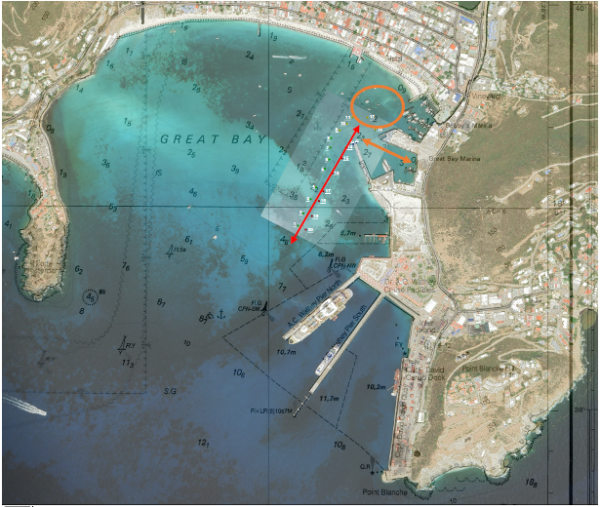 PORT ST. MAARTEN:--- The Port St. Maarten Group (PSG) would like to inform mariners and other stakeholders that Dock Maarten Marina has dredged a channel and turning basin to give vessels with deep draft, that cannot cross the sand bar in Great Bay, access to and from their marina.
PORT ST. MAARTEN:--- The Port St. Maarten Group (PSG) would like to inform mariners and other stakeholders that Dock Maarten Marina has dredged a channel and turning basin to give vessels with deep draft, that cannot cross the sand bar in Great Bay, access to and from their marina.
Mariners and boat owners should confirm with Marina for water depths and if there are any changes in the channel, as well as depths at their facility.
Bobby’s Marina can be reached on Marine VHF Channels calling 16 and working on 69, and Dock Maarten Marina on Marine VHF Channels, calling on 16 and working on 87.
Anchoring is prohibited in or near the channel or turning basin so that the channel is obstructed.
Mooring alongside marinas should not obstruct access to or from any of the facilities or properties.
The channel and turning basin, access to the marinas and adjacent properties are not to be used as a shelter in case of inclement weather as this poses a danger to these properties.
Use of the channel is in accordance with the International Regulations for Preventing Collisions at Sea 1972.
The channel is marked in accordance with the International Association of Lighthouse Authorities Zone B.
For vessels going to the Northeast side of Great Bay, using the channel, captains must take note, red buoys are on the right side of the channel when coming from the sea; green markers are on the left side of the channel coming from the sea; yellow markers are special markers showing the turning circle of the dredged area.
Mariners must take note of the following information for the use of the channel based on International Regulations for Preventing Collisions at Sea 1972.
Part B — Steering and sailing rules Section I — Conduct of vessels in any condition of visibility. Rule 9 — Narrow channels
(a) A vessel proceeding along the course of a narrow channel or fairway shall keep as near to the outer limit of the channel or fairway which lies on her starboard side as is safe and practicable.
(b) A vessel of less than 20 meters in length or a sailing vessel shall not impede the passage of a vessel which can safely navigate only within a narrow channel or fairway.
(c) A vessel engaged in fishing shall not impede the passage of any other vessel navigating within a narrow channel or fairway.
(d) A vessel shall not cross a narrow channel or fairway if such crossing impedes the passage of a vessel which can safely navigate only within such channel or fairway. The latter vessel may use the sound signal prescribed in Rule 34(d) if in doubt as to the intention of the crossing vessel.
(e) (i) In a narrow channel or fairway when overtaking can take place only if the vessel to be overtaken must take action to permit safe passing, the vessel intending to overtake shall indicate her intention by sounding the appropriate signal prescribed in Rule 34(c)(i). The vessel to be overtaken shall, if in agreement, sound the appropriate signal prescribed in Rule 34(c)(ii) and take steps to permit safe passing. If in doubt she may sound the signals prescribed in Rule 34(d). (ii) This Rule does not relieve the overtaking vessel of her obligation under Rule 13.
(f) A vessel nearing a bend or an area of a narrow channel or fairway where other vessels may be obscured by an intervening obstruction shall navigate with alertness and caution and shall sound the appropriate signal prescribed in Rule 34(e).
(g) Any vessel shall, if the circumstances of the case admit, avoid anchoring in a narrow channel
Section II – Vessels in sight of one another:
Rule 18:
(d) (i) Any vessel other than a vessel not under command or a vessel restricted in her ability to maneuver shall, if the circumstances of the case admit, avoid impeding the safe passage of a vessel constrained by her draught, exhibiting the signals in Rule 28.
Part C — Lights and shapes.
Rule 28:
A vessel constrained by her draught may, in addition to the lights prescribed for power-driven vessels in Rule 23, exhibit where they can best be seen three all-round red lights in a vertical line, or a cylinder.









